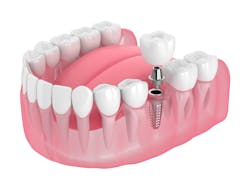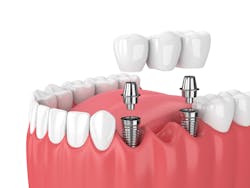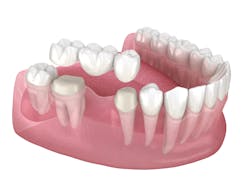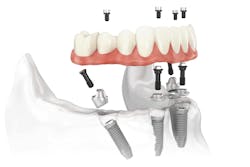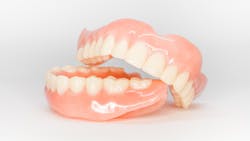Do you have a few gaps in your smile?
If so, you’re probably wondering about the options for missing teeth. Whether lost to injury, decay, or gum disease, if not replaced, missing teeth can have a detrimental impact on more than just the function and appearance of your smile. Lost teeth can lead to many negative physiological and psychological implications down the road, such as jaw bone loss, difficulty eating and speaking, permanent changes to your appearance, loss of confidence, low self-esteem, and withdrawal from social interactions. This is why tooth replacement options are so important for both your oral and overall health and well-being.
From dental implants to dentures, there are many different missing tooth options you can choose from to restore your smile. However, each option comes with a few advantages and disadvantages that you should be aware of. Here’s a look at each.
Dental implants
Dental implants are the closest replacement possible for natural teeth. The dental implant procedure involves the placement of a titanium post into the jaw, which serves as an artificial tooth root. The implant post is then topped with an abutment and an implant tooth or dental crown to help fill in the gap left behind by the missing tooth. The titanium dental implant then fuses or “osseointegrates” with the jawbone, which further helps secure and support the implant. The osseointegration process can take between 3 to 6 months.
Advantages of dental implants
- Look and function like real teeth
- Extremely durable; titanium implants can last decades with proper care
- Help to prevent jaw bone loss
- Does not impact adjacent teeth
Disadvantages of dental implants
- Require surgery
- Recovery and healing time may take up to 6 months
- Only suitable for certain patients
- More expensive than interim or removable tooth replacement options
Implant-supported bridges
Implant-supported bridges are used when patients have a few missing teeth in a row. In this procedure, two (or more) dental implants are inserted into the jaw at either end of the missing row of teeth. These dental implants are then used to secure a tooth bridge of several teeth in place.
Advantages of implant-supported bridges
- Restores natural appearance and function of teeth
- Extremely long-lasting and durable
- No damage to neighboring teeth
- Prevents bone loss in jaw
Disadvantages of implant-supported bridges
- Requires a surgical procedure
- In some cases, the removal of existing teeth is required
- Lengthy recovery and healing time of up to 6 months
- More costly than other non-implant tooth bridge options
Tooth-supported bridges
A tooth-supported bridge is another replacement option for multiple missing teeth. This option uses the existing teeth on either side of the row of missing teeth to support the placement of a tooth bridge. The supporting teeth are fitted with dental crowns, which helps to secure the bridge in place.
Advantages of tooth-supported bridges
- No surgery required
- Very little recovery or downtime
- Look and feel like natural teeth
- Less costly than an implant-supported bridge
Disadvantages of tooth-supported bridges
- In some cases, removal or filing down of healthy existing teeth is required
- Supporting teeth may be at risk of damage over time
- Food particles can get stuck under the tooth bridge and can be difficult to clean away, leading to a risk of infection
- Jaw bone loss can still occur in the area where the tooth is missing
All-on-4 implants (full mouth dental implants)
All-on-4 implants (sometimes referred to as full-mouth dental implants) are recommended in cases where the patient has lost or is about to lose all of their teeth in their upper or lower jaw (or both). This option provides an effective, long-lasting, and natural-looking alternative to false teeth or dentures. During the All-on-4 procedure, at least four titanium implants are embedded into the jaw and a tooth bridge of up to 12 teeth is permanently fitted on top.
The All-on-4 treatment concept was developed by Nobel Biocare and uses a specialized implant placement technique that reduces or eliminates the need for bone grafting. Plus, the implant tooth bridge can be connected in as few as two to three days after surgery.
Advantages of All-on-4 implants
- Permanently restore full function and appearance of teeth
- Look just like natural teeth
- Tooth bridge can be fitted in just two to three days after surgery
- Extremely durable; All-on-4 implants can last a lifetime with proper care
- Do not require jaw bone grafting in most cases
Disadvantages of All-on-4 implants
- More expensive than other options for missing teeth
- Require surgical procedure and a few months of healing time
- Existing teeth may need to be removed in some cases
- Only suitable for certain patients
Dentures
Dentures offer a more affordable and removable tooth replacement option for missing teeth. A patient can be fitted with either full dentures or partial dentures, depending on the number of teeth lost. With dentures, the replacement teeth are not permanently fixed into the mouth. Instead, the false teeth are fixed to a plastic base which is moulded to snugly fit the patient’s mouth.
Advantages of dentures
- Most affordable option for missing teeth
- Do not require surgery (unless existing teeth need to be removed)
- No recovery time or downtime involved
- Easy to clean and repair if damaged
Disadvantages of dentures
- Not a permanent or long-term solution; dentures must be replaced every five to 10 years
- Can be loose and uncomfortable, making eating and speaking difficult
- Do not look or feel as natural as dental implants
- Must be removed for cleaning and during sleep, making them more susceptible to accidental loss or damage
Which options for missing teeth are right for you?
While there are many options for missing teeth, the right one for you will depend on your unique circumstances. The best way to determine the most suitable tooth replacement option for your smile is to visit your dentist for a personalized treatment plan.
About the Author

David Dunn
Dr. David Dunn is an esthetic dentist from the Macquarie Street Centre For Implant & Aesthetic Dentistry in Sydney, Australia. With over 25 years of clinical and diagnostic experience, Dr. Dunn is recognized nationally and internationally for his expertise. He regularly lectures dentists both in Australia and abroad on how to achieve exceptional results with cosmetic dentistry and dental implants.

